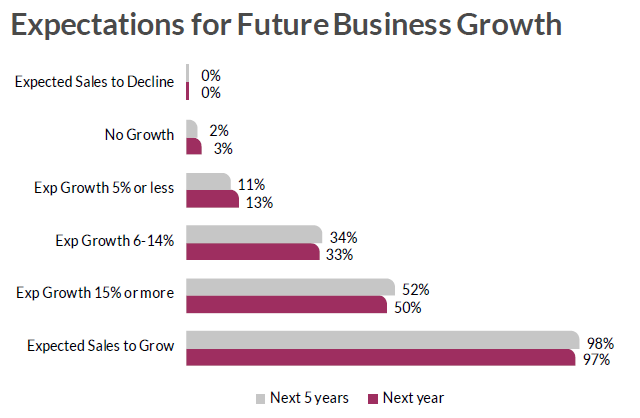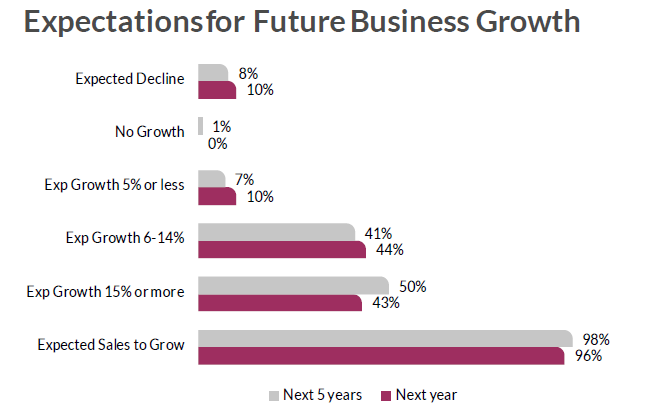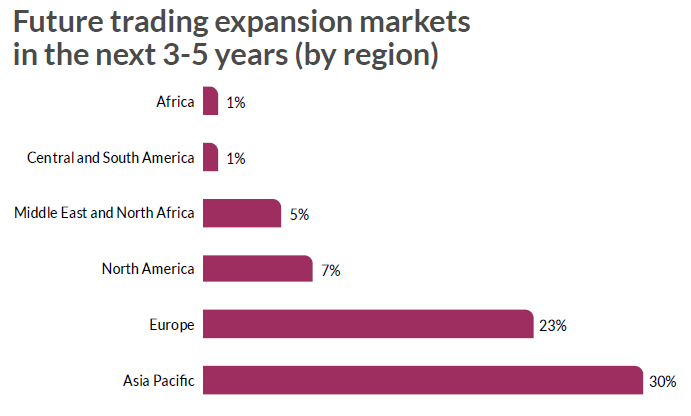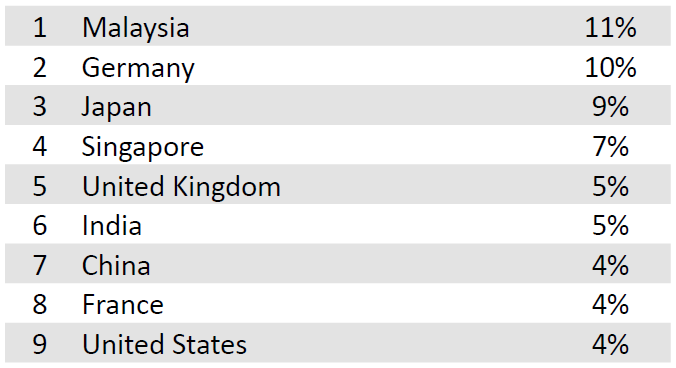Businesses Expect Robust Growth Next Year
According to the HSBC flagship report ‘Navigator’, 97% of business enterprises in Bangladesh say they will expand their operations next year. This renewed confidence comes by way of a strong economy and positive international trade prospects. The Navigator survey is the largest of its kind, conducted by Kantar, a major research company, on behalf of HSBC.
The study takes into account the sentiments and expectations of businesses about the near to mid-term future on a multitude of topics, that include: business outlook, international trade, geopolitics, sustainability, technology and wellbeing. It is compiled from responses by decision-makers working at 9,131 businesses (small, mid-market and large) across a broad range of industry sectors in over 30 markets. The survey was conducted between August and September of 2019.
Bangladesh is one of the fastest growing economies in the world. Its GDP has nearly tripled in the last 10 years and continues to grow at around 7-8% every year. This growth is driven by strong economic demand, private consumption and exports. The market has greatly benefited from trans-Pacific trade tensions by boosting exports to both China and the US, although it is not insulated from softening global demand.
Bangladeshi businesses are brimming with confidence, a reflection of the booming economy. Almost every company (97%) is projecting growth in the next year, half of which are classed as high-growth firms that are expecting to grow by 15% or more – which is more than double the global average at 22%. On a five-year horizon this dynamism is expected to continue, with 52% of Bangladeshi firms also expecting growth of 15% or more. 77% of Bangladeshi companies think a favorable political climate is a key driver for growth, compared with just 20% of firms surveyed globally.

India, by comparison, is expected to become one of the world’s top three economic powers over the next 10 to 15 years. Government initiatives such as 'Make in India' and 'Digital India' aim to boost the manufacturing and technology sectors, making Indian businesses are highly optimistic for the future, both near and long term. The country’s status as the world’s third largest base for fledging businesses, with more than 4,750 tech start-ups only serves to add to the optimism.
Over the past year, companies in India have become more optimistic about their business. Almost all (98%) companies surveyed expect their sales to grow over the next five years, while half (50%) anticipate growth of more than 15%. These high-growth firms are more than twice as optimistic as businesses globally, just like Bangladesh. This confidence comes from the prospect of new markets opening up, the availability of high quality suppliers and plans to invest in technologies that will pave the way for new products and services.

Bangladeshi businesses share the global sentiment that trade will continue to grow over the next five years. China is still the largest single trading partner, although the number of Bangladeshi companies trading with China has dropped from 50% to 43%. Japan has more than tripled (3x) in importance in the past year, to 36% up from 11% in 2018, replacing Malaysia to become the second most important trade partner in Asia Pacific Region. Meanwhile, trade with most major European economies, such as Germany, France and Italy has fallen by more than 50% in the last year or so. The slack has been picked up by the US, which has doubled in importance (to 16%) over that same year.
Bangladeshi businesses believe international trade is a force for good, with many confident that it will drive innovation (94%) and improve efficiency (92%).

Future trading expansion markets in the next three to five years (by market)

Firms in India believe North America, Europe and markets in Asia Pacific region will continue to be their key trading partners, and there are indications that both Europe and North America will rise in importance over the next 3-5 years. While firms believe will remain strong (expected to grow from 47% to 49%), Europe (from 34% to 45%) and North America (from 27% to 32%) are believed to be increasingly important. In the Asia Pacific region, China (expected to grow from 9% to 11%) and Japan (expected to grow from 6% to 10%) are expected to gain further importance for Indian firms in the next 3-5 years.
More than two-thirds of Bangladeshi businesses believe that introducing sustainable business practices will increase sales, while nearly 50% think it will help them better meet buyer expectations. Bangladeshi companies are well ahead of the global average in considering these factors (both factors cited by 23% of firms globally). Companies are also feeling external pressure to adopt sustainable practices in the next five years: 60% see investors as the primary driver in this area while 55% feel motivated by pressure from competitors. 5G and data security are the two technologies which Bangladeshi companies believe will have the greatest impact on business in the next 5 years.
The need to improve both the transparency and efficiency of business operations are the main drivers for sustainability in India, but companies are also under pressure to meet regulatory standards. While customer expectations are less of a motivating factor than in many other markets, this is still cited as one of the key reasons to adopt sustainable practices. Indian businesses feel the most relevant UN Sustainable Development Goals are health and wellbeing (38%), followed by quality education (33%), and gender equality, and innovation and infrastructure (both 31%). Across the environmental, social and governance factors, businesses in India focus on executive salary and compensation (relevant for: 35%, measured by: 25%), and product safety and quality (relevant for: 26%, measured by: 17%) the most. Artificial intelligence (AI), data security, 5G and the Internet of Things (IoT) are the technologies Indian companies believe will have the biggest impact on their business in the future. While technology is seen as an enabler for improving productivity and reducing costs, there are some specific benefits linked to certain innovations. AI, IoT, data security and 5G, for example, are expected to help improve speed to market, while 5G is also seen as likely to lead to improved sustainability. Companies suggest both IoT and 5G have the power to improve product and service delivery, while data security technologies are expected to improve the customer experience.
It seems as though India is a few years ahead of Bangladesh in considering, planning and implementing not only technology, but also employee wellbeing and fair treatment in the workplace as necessities for sustainable business practices.

Monthly Business Review - December 2019
According to a study in 2015 by the Boston Consulting Group, the middle and affluent class (MAC), which includes households that earn at least USD 401 (or BDT 34,000) per month or higher, in Bangladesh is expected to grow to 34 million in number by 2025. Which means, in the coming years the demand of the consumer durables will increase significantly.
Question may arise out of all the consumer electronic durables, why only financing of white goods (large machines with an enamel finish; for example: refrigerators, air conditioners, washing machines, microwave ovens etc.) is more focused here. The answer is simple, it’s growing demand. Even a few years ago air conditioners or microwave ovens used to be a sign of luxury but now a days such products can easily be categorized as necessity. One of the reasons behind such rapid growth in usage can be increased purchasing power but the role of nuclear families or working women cannot be denied. Convenience is the biggest selling trait of any product in the modern world.
Although the middle income class has drastically risen in the last decade, people are not comfortable spending large amounts of money at once. India has achieved a praiseworthy expertise in case of white goods financing. 60% of the total sale are now made through specific financing instruments out of which only 12-15% is via credit card. With the blessings of data analytics and alternative credit scoring, India is now capable of analyzing a client’s credit worthiness within few minutes which helps them to cater the growing need efficiently and this is where we have a great scope for improvement. However, to achieve such expertise, the first and foremost requirement is infrastructural development and expertise on data analytics. Moreover, regulatory incentives are also necessary to reach such accomplishment.
Download View